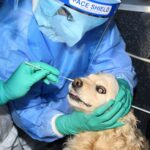Snoring is something that many people wonder about when they hear their dog snoring for the first time. There are many possible causes of a dog’s snoring.
Some canine breeds are more prone to snoring than others when they sleep. However, excessive snoring can indicate a health issue with your closest companion.
While your dog’s snoring might be completely natural, you should be concerned. So, if you’re considering taking your snorer to the vet, here is what you should know.
Even if your dog has a snoring habit, it is good to check its face to see any unusual features. Certain breeds of dogs snore far more than others. Snoring is more common in dogs with shorter snouts and flat faces. These traits are brachycephalic, which means “short-headed.”
Pugs, Boxers, and Bulldogs are the most common short-headed dog breeds. The small muzzles of these lovely creatures can cause them to snore. Due to their short head faces, these dog breeds are more likely to create noise while they sleep.
If your dog snores all the time, you don’t need to worry. However, you should consult a veterinarian if you observe a change in your pet’s breathing pattern or if he appears to be gasping. Otherwise, these charming buddies snore regularly.
In the same way humans snore, dogs snore when airflow is restricted in their nasal passages or throat.

Like people, dogs make noise when they snore because of their soft tissue vibrations in the throat when they sleep. When something interferes with the dog’s regular airflow, vibrations occur. This can have a simple explanation.
Dogs may snore because they like to lie on their backs, where their tongues might partially obstruct airflow. Alternatively, your dog may be hypersensitive to dust or smoke, which can also cause snoring.
Also, there are more significant health concerns, such as an abscessed tooth entering the nasal sinus tract or sleep apnea. Both problems, of course, may necessitate surgical intervention.
The sound of a dog snoring may be both amusing and irritating. It is common in healthy dogs. However, canine snoring is sometimes a sign of health issues, specifically if the dog snores while awake.
Hearing your dog snore may amuse you from time to time. If you have a dog that sleeps in the same room as you, you might find it irritating at other times. The fact is that snoring is usually absolutely natural and harmless.
While there are several causes for dogs to snore, the following are the most prevalent:
A healthy dog’s throat is meant to keep him calm and oxygenated. Too much or too lax tissue might compress the throat.
Dogs snore when their nasal passageways or throat are blocked like all humans. This is entirely natural and could be caused when your dog lies on his back. The tongue can retract into the throat, preventing easy breathing.
Snoring is far more prevalent in breeds with extremely short muzzles, as there is little space in the dog’s mouth to accommodate all soft tissue.
Obesity is also another common factor in canine snoring. Excess fat can accumulate in the throat of overweight dogs, causing them to choke. Giving your dog cookies may seem like a beautiful idea, but it may result in his noisy breathing.
When a dog is highly obese, excess fat can accumulate in the throat, obstructing the airways and snoring.
Sleep apnoea is a less likely reason for your dog snoring. Sleep apnoea causes people and canines to breathe shallowly or cease breathing entirely during sleep. Like humans, dogs can get this condition, but it is rare.
They usually continue breathing with a strong inhale that sounds like snoring. If you believe your dog has sleep apnoea, it is vital to take it to the veterinarian for treatment.
Infections such as Kennel Cough – a type of canine flu – can block and inflame the airways, resulting in temporary snoring. If so, the snoring usually stops after the dog improves.
Nasal secretions in dogs should not be ignored. Nasal discharge is generally an indication of an infection that requires medical attention. A sinus infection or an eye problem like conjunctivitis can induce a runny nose. This could be a symptom of an allergy in your dog.
Like people, dogs can develop allergies. This could be dust, perfume, or several other pets in the house, causing your dog to have an allergic reaction. They may have hayfever, leading them to snore. Cleaning your dog’s feet, showering them with a hypoallergenic cleanser, and dust with a damp cloth will help lessen allergies.
Your dog might be suffering from a dental abscess or an oral / sinus growth. This will cause him to snore. Tooth problems can usually be painful, so take your dog to the veterinarian instantly if you suspect he may have dental issues. Untreated infections can spread throughout a pet’s body, causing significant issues.
Aspergillosis is a fungal infection typically spread via grass clippings, hay, straw, or dusty things. It is caused by mold entering the dog’s nose via the moist lining. This is more prevalent in pet dogs and canines that spend a significant amount of time outdoors.
Sneezing, swelling, nasal discharge, and snoring are all common symptoms. It’s dangerous if left untreated but usually clears up with antifungal medication.
Occasionally, you may find that your dog began snoring just after starting a medicine course. It is possible, as several medications have side effects that include narrowed airways. Painkillers and other medications might induce the throat to relax, causing snoring.
Consult your vet if you suspect a medication is causing your dog’s snoring. If your dog requires medication, you will almost certainly have to put up with the snoring, though your veterinarian may be able to alleviate the symptoms.
Like the common cold in humans, Rhinitis in dogs affects the nose. Your pet may develop a runny and stuffy nose due to the inflammation of his mucus membranes. If your dog has Rhinitis, it may sneeze, breathe slowly, and snore. Antibiotics can be used to treat this. However, adding moisture to the air with a humidifier can also make breathing more comfortable.
Smoking in the same residence as your dog can damage their lungs, which can cause things such as bronchitis and asthma. It should be avoided if you value the health and well-being of your dog and yourself.
Snoring is more common in certain breeds than others, and in these cases, it may indicate more severe health difficulties. Consider brachycephaly, the most susceptible breed.
It is common for breeders to select short, broadheads, and short snouts for several canine breeds, such as the English bulldog, Pug, and King Charles Cavalier. These dog breeds are brachycephalic, and they are considerably more prone to snore. This naturally results in reduced nasal passageways for these short-nosed breeds.
Despite their shorter snouts, the soft palates of brachycephalic dogs have remained unchanged through the generations, giving them an enlarged appearance in certain breeds. Dog snoring is a common occurrence among certain breeds, and their owners should be aware of what it can signify.
Brachycephalic dogs frequently develop ‘everted laryngeal saccules,’ or blocked airways. This results in excessive snoring, sometimes even while awake. Numerous brachycephalic dogs also have entirely or partially blocked nostrils, resulting in a ‘crescent’ entrance rather than a lovely open ‘tunnel.’
Nasal stenosis is a congenital disease that blocks nasal passageways and restricts breathing.
The noise occurs when the dog inhales or sucks air into its lungs. The suction effect creates muscle vibrations that cause snoring.
When there is a strong breeze, the clothing moves and makes snapping, slapping noises.
At the rear of a dog’s throat, the same rules apply. If the dog has an extended soft palate (the fatty portion of the nose that separates it from the throat), it flaps around when it breathes.
However, elongated soft palates are not the essential features contributing to dogs’ snoring. Anything that disrupts the air circulation in the nasal passages might result in snoring or snorting in dogs.
Breathing problems associated with smush-faced dogs include everted laryngeal saccules.
Snoring can cause significant health issues. Research on rabbits found that snoring has been related to more energy, mainly in the carotid artery. One study revealed that dogs with sleep apnea (snoring) were also associated with high blood pressure.
Most vets would agree that snoring isn’t likely to cause any harm to your Labrador. Dogs’ sleep apnea is quite rare, and Labrador retrievers have a typically healthy respiratory system. Of course, this may vary for various dog breeds, particularly those with brachycephaly.
If your dog’s snoring is unusual or getting worse, immediately take him to the veterinarian. For now, there are things you can do that might help your dog not snore as much.
There is no sure way to prevent a dog from snoring, but there are a few things you may try. These include the following:
Although your dog is skinny and slim, you may care to try losing a few pounds. This may, in some situations, be all you need to do to stop the snoring. Additionally, your dog will feel much better, be more active, and have better overall health.
Cigarette smoke undoubtedly irritates your dog’s lungs and may cause canine snoring. If you smoke and don’t plan to quit soon, one approach is to smoke outside. A week is enough time to see whether it helps your dog. If you make these changes for the long term, you reduce your dog’s cancer risk from passive smoking.
You may find it beneficial to change your dog’s sleeping position. It’s simple to accomplish, and there’s no risk in trying something new.
You are making sure your dog curls up rather than sprawling out on her back is one of the most effective cures for mild snoring. This is best accomplished with a circular or oval bed, which you can cuddle her into and make her feel special.
Some owners provide a raised, padded edge bed to encourage the dog to sleep with his head elevated.
Surgery may be an option if your dog’s issue is primarily a result of their facial structure.
Rather than a facelift, this is surgery to shorten the soft palate. By narrowing it down, doctors can eliminate it from the windpipe’s entrance, reducing vibration and alleviating or preventing dog snoring.
Many veterinarians in general practice suggest referring structural issues to specialists. This benefits the professional to examine additional soft tissue structures, such as eliminating tonsils or enlarging the nostrils, for remedial measures.
If your dog’s snoring is due to irritations that produce inflammation and worsen their condition, it may be time to make a change.
Vacuum every day, deep clean the dog’s bedding, and avoid using scented candles.
A specialized camera is placed up the dog’s nose to monitor the situation.
Rhinoscopy can aid in detecting obstructions and allow for the harvesting of tissue samples for investigation.
A grass awn can be removed endoscopically, which would solve the problem right away. If they detect something more serious, such as a tumor, Samples can be taken to determine the best course of action.
Snoring can occur whenever the overweight dog has excessive fat around the throat. Please consult your veterinarian about reducing the dog’s diet and boosting their activity to burn off the fat.
A heated room dries out nasal discharge and increases snoring. Using a humidifier can help relieve irritation and discomfort in the airways.
Dogs sometimes snore while they are awake. This isn’t snoring at all, but rather noisy breathing. This could be because you chose a brachycephalic dog.
However, there are numerous other reasons for dogs to snore when awake. The primary cause is a lack of air flowing.




